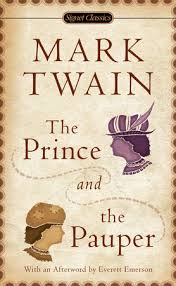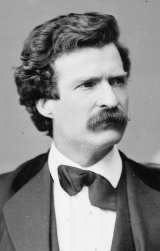The Prince and the Pauper Page #9
The Prince and the Pauper is a novel by American author Mark Twain. It was first published in 1881 in Canada, before its 1882 publication in the United States. The novel represents Twain's first attempt at historical fiction.
“Tush, he must be the prince! Will any be in all the land maintain there can be two, not of one blood and birth, so marvellously twinned? And even were it so, ’twere yet a stranger miracle that chance should cast the one into the other’s place. Nay, ’tis folly, folly, folly!” Presently he said-- “Now were he impostor and called himself prince, look you that would be natural; that would be reasonable. But lived ever an impostor yet, who, being called prince by the king, prince by the court, prince by all, denied his dignity and pleaded against his exaltation? No! By the soul of St. Swithin, no! This is the true prince, gone mad!” CHAPTER VII. Tom’s first royal dinner. Somewhat after one in the afternoon, Tom resignedly underwent the ordeal of being dressed for dinner. He found himself as finely clothed as before, but everything different, everything changed, from his ruff to his stockings. He was presently conducted with much state to a spacious and ornate apartment, where a table was already set for one. Its furniture was all of massy gold, and beautified with designs which well-nigh made it priceless, since they were the work of Benvenuto. The room was half-filled with noble servitors. A chaplain said grace, and Tom was about to fall to, for hunger had long been constitutional with him, but was interrupted by my lord the Earl of Berkeley, who fastened a napkin about his neck; for the great post of Diaperers to the Prince of Wales was hereditary in this nobleman’s family. Tom’s cupbearer was present, and forestalled all his attempts to help himself to wine. The Taster to his highness the Prince of Wales was there also, prepared to taste any suspicious dish upon requirement, and run the risk of being poisoned. He was only an ornamental appendage at this time, and was seldom called upon to exercise his function; but there had been times, not many generations past, when the office of taster had its perils, and was not a grandeur to be desired. Why they did not use a dog or a plumber seems strange; but all the ways of royalty are strange. My Lord d’Arcy, First Groom of the Chamber, was there, to do goodness knows what; but there he was--let that suffice. The Lord Chief Butler was there, and stood behind Tom’s chair, overseeing the solemnities, under command of the Lord Great Steward and the Lord Head Cook, who stood near. Tom had three hundred and eighty-four servants beside these; but they were not all in that room, of course, nor the quarter of them; neither was Tom aware yet that they existed. All those that were present had been well drilled within the hour to remember that the prince was temporarily out of his head, and to be careful to show no surprise at his vagaries. These ‘vagaries’ were soon on exhibition before them; but they only moved their compassion and their sorrow, not their mirth. It was a heavy affliction to them to see the beloved prince so stricken. Poor Tom ate with his fingers mainly; but no one smiled at it, or even seemed to observe it. He inspected his napkin curiously, and with deep interest, for it was of a very dainty and beautiful fabric, then said with simplicity-- “Prithee, take it away, lest in mine unheedfulness it be soiled.” The Hereditary Diaperer took it away with reverent manner, and without word or protest of any sort. Tom examined the turnips and the lettuce with interest, and asked what they were, and if they were to be eaten; for it was only recently that men had begun to raise these things in England in place of importing them as luxuries from Holland. {1} His question was answered with grave respect, and no surprise manifested. When he had finished his dessert, he filled his pockets with nuts; but nobody appeared to be aware of it, or disturbed by it. But the next moment he was himself disturbed by it, and showed discomposure; for this was the only service he had been permitted to do with his own hands during the meal, and he did not doubt that he had done a most improper and unprincely thing. At that moment the muscles of his nose began to twitch, and the end of that organ to lift and wrinkle. This continued, and Tom began to evince a growing distress. He looked appealingly, first at one and then another of the lords about him, and tears came into his eyes. They sprang forward with dismay in their faces, and begged to know his trouble. Tom said with genuine anguish-- “I crave your indulgence: my nose itcheth cruelly. What is the custom and usage in this emergence? Prithee, speed, for ’tis but a little time that I can bear it.” None smiled; but all were sore perplexed, and looked one to the other in deep tribulation for counsel. But behold, here was a dead wall, and nothing in English history to tell how to get over it. The Master of Ceremonies was not present: there was no one who felt safe to venture upon this uncharted sea, or risk the attempt to solve this solemn problem. Alas! there was no Hereditary Scratcher. Meantime the tears had overflowed their banks, and begun to trickle down Tom’s cheeks. His twitching nose was pleading more urgently than ever for relief. At last nature broke down the barriers of etiquette: Tom lifted up an inward prayer for pardon if he was doing wrong, and brought relief to the burdened hearts of his court by scratching his nose himself. His meal being ended, a lord came and held before him a broad, shallow, golden dish with fragrant rosewater in it, to cleanse his mouth and fingers with; and my lord the Hereditary Diaperer stood by with a napkin for his use. Tom gazed at the dish a puzzled moment or two, then raised it to his lips, and gravely took a draught. Then he returned it to the waiting lord, and said-- “Nay, it likes me not, my lord: it hath a pretty flavour, but it wanteth strength.” This new eccentricity of the prince’s ruined mind made all the hearts about him ache; but the sad sight moved none to merriment. Tom’s next unconscious blunder was to get up and leave the table just when the chaplain had taken his stand behind his chair, and with uplifted hands, and closed, uplifted eyes, was in the act of beginning the blessing. Still nobody seemed to perceive that the prince had done a thing unusual. By his own request our small friend was now conducted to his private cabinet, and left there alone to his own devices. Hanging upon hooks in the oaken wainscoting were the several pieces of a suit of shining steel armour, covered all over with beautiful designs exquisitely inlaid in gold. This martial panoply belonged to the true prince--a recent present from Madam Parr the Queen. Tom put on the greaves, the gauntlets, the plumed helmet, and such other pieces as he could don without assistance, and for a while was minded to call for help and complete the matter, but bethought him of the nuts he had brought away from dinner, and the joy it would be to eat them with no crowd to eye him, and no Grand Hereditaries to pester him with undesired services; so he restored the pretty things to their several places, and soon was cracking nuts, and feeling almost naturally happy for the first time since God for his sins had made him a prince. When the nuts were all gone, he stumbled upon some inviting books in a closet, among them one about the etiquette of the English court. This was a prize. He lay down upon a sumptuous divan, and proceeded to instruct himself with honest zeal. Let us leave him there for the present.
Translation
Translate and read this book in other languages:
Select another language:
- - Select -
- 简体中文 (Chinese - Simplified)
- 繁體中文 (Chinese - Traditional)
- Español (Spanish)
- Esperanto (Esperanto)
- 日本語 (Japanese)
- Português (Portuguese)
- Deutsch (German)
- العربية (Arabic)
- Français (French)
- Русский (Russian)
- ಕನ್ನಡ (Kannada)
- 한국어 (Korean)
- עברית (Hebrew)
- Gaeilge (Irish)
- Українська (Ukrainian)
- اردو (Urdu)
- Magyar (Hungarian)
- मानक हिन्दी (Hindi)
- Indonesia (Indonesian)
- Italiano (Italian)
- தமிழ் (Tamil)
- Türkçe (Turkish)
- తెలుగు (Telugu)
- ภาษาไทย (Thai)
- Tiếng Việt (Vietnamese)
- Čeština (Czech)
- Polski (Polish)
- Bahasa Indonesia (Indonesian)
- Românește (Romanian)
- Nederlands (Dutch)
- Ελληνικά (Greek)
- Latinum (Latin)
- Svenska (Swedish)
- Dansk (Danish)
- Suomi (Finnish)
- فارسی (Persian)
- ייִדיש (Yiddish)
- հայերեն (Armenian)
- Norsk (Norwegian)
- English (English)
Citation
Use the citation below to add this book to your bibliography:
Style:MLAChicagoAPA
"The Prince and the Pauper Books." Literature.com. STANDS4 LLC, 2025. Web. 6 Feb. 2025. <https://www.literature.com/book/the_prince_and_the_pauper_315>.








Discuss this The Prince and the Pauper book with the community:
Report Comment
We're doing our best to make sure our content is useful, accurate and safe.
If by any chance you spot an inappropriate comment while navigating through our website please use this form to let us know, and we'll take care of it shortly.
Attachment
You need to be logged in to favorite.
Log In